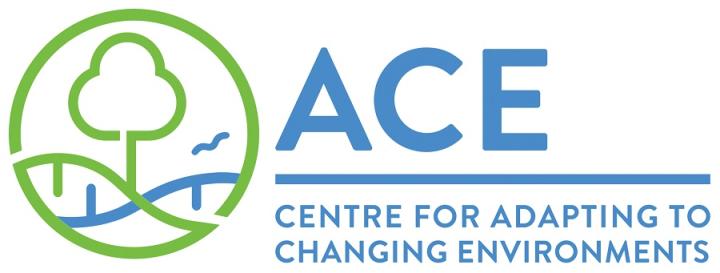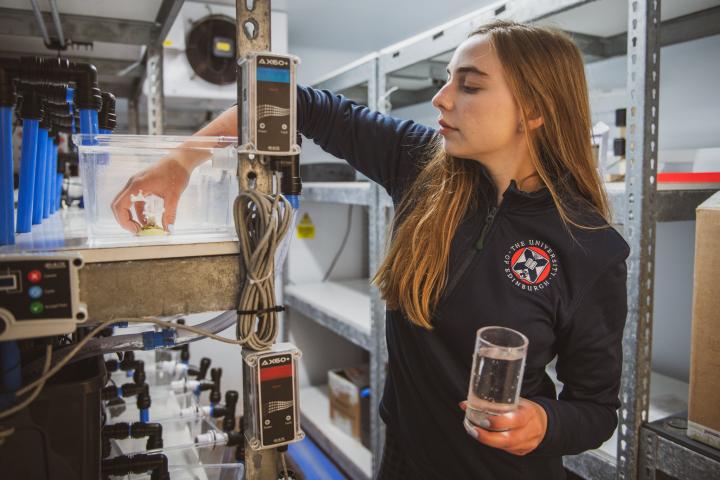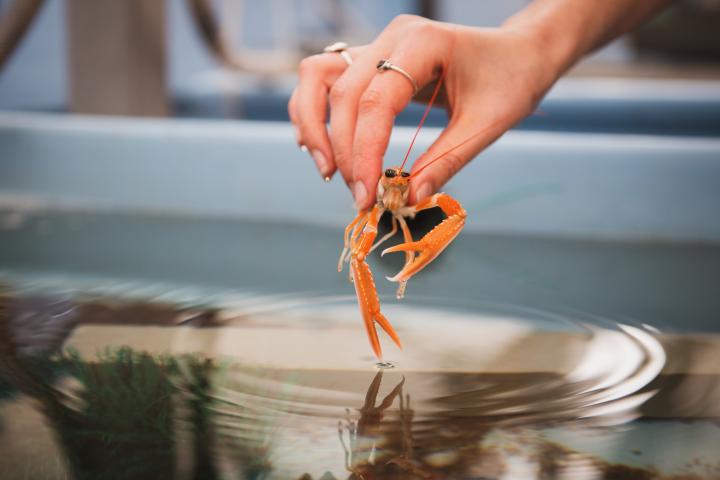Ecology, Biology & Epidemiology
The University of Edinburgh is actively involved in cutting-edge research within ecology, biology, and epidemiology fields.
Advancing human knowledge about the wellbeing of marine organisms and ecosystems under current and future climate scenarios and with the intensification of human activities in the oceans is key for achieving clean, healthy, and productive waters for future generations.
Environmental aspects of marine and ocean science primarily take place in the School of GeoSciences, where ocean related grant revenue over the last five years exceeds £20M.
Multidisciplinary collaboration to address environmental change:
Centre for Adapting to Changing Environments (ACE)

Recognising that natural and human induced changes are altering the environment at an unprecedented rate, the Centre for Adapting to Changing Environments (ACE) brings together multidisciplinary research to address how populations can adapt to our rapidly changing world. ACE brings together diverse expertise from over 100 different research groups and networks from across the University of Edinburgh, including early career researchers, to support and facilitate collaboration.
Investigating the impacts and implications of ocean changes:
The Changing Oceans Research Group
The Changing Oceans Research Group is an interdisciplinary group of researchers striving to better understand the structure and functioning of marine ecosystems under future ocean conditions. While grounded in marine ecology, Changing Oceans research activities cover a wide spectrum of research objectives with projects running in the deep and open ocean, tropics and polar regions. Examples of research contributions in the field include:
- Contributions to Chapter 7E (Cold Water Corals) and 7L (Seamounts and Pinnacles) of the 2nd United Nations World Ocean Assessment.
- Contributions to Chapter 5 (Changing Ocean, Marine Ecosystems, and Dependent Communities) of the Intergovernmental Panel for the Climate Change (IPCC) Special Report on the Ocean and Cryosphere in a Changing Climate.

International ocean research project leadership:
iAtlantic Project

The Horizon 2020 Atlantic Project (2019-23) is coordinated out of the School of Geosciences by Prof Murray Roberts. Involving marine scientists from countries bordering the North and South Atlantic Ocean, iAtlantic will assess deep and open Atlantic ecosystems and determine their resilience to threats such as temperature rise, pollution and human activities. At the forefront of iAtlantic’s approach is the promotion of trans-Atlantic scientific collaboration, and the sharing of expertise, equipment, infrastructure, data and personnel.
ATLAS Project
The Horizon 2020 ATLAS Project (2016-2020) was coordinated out of the School of GeoSciences by Prof Murray Roberts. ATLAS assembled 12 cross-cutting case studies to provide the first coherent, integrated basin-scale assessment of Atlantic deep-water ecosystems and their Blue Growth potential. The ATLAS consortium consisted of 24 interdisciplinary partners and one linked third party from across 12 countries and resulted in over 130 peer-reviewed publications, 45 offshore research expeditions, and a media reach estimated at over 400 million.
Leading the way in marine pollution and ecotoxicology research:
The University of Edinburgh has been conducting pioneering research on the accumulation of marine microplastics and their effects on marine organisms in collaboration with other national and international research institutions, including:
- Baseline assessment of marine litter and microplastic ingestion at cold-water reefs off Scotland.
- Assessment of microplastic distribution in the Eurasian Arctic, conducted in collaboration with the Norwegian Institute of Water Research and Institute of Oceanology, Russian Academy of Sciences.
- Participation in the research grant “Harmonization of methods of marine microplastic assessment in the Arctic” led by the Norwegian Institute for Water Research (NIVA).
Constituents of crude oil and other contaminants, such as chemical dispersants used following an oil spill, enter marine environments through both purposeful and accidental release. The Changing Oceans group has been leading research on the impacts and implications of this on vulnerable marine organisms, such as:
- The effects of toxicants on key marine organisms such as sponges.
- The impacts of dispersants used following an oil spill.
Investigating evolutionary biological changes to better understand the present and future of our ocean:
Understanding and projecting organismal responses to ocean change is an evolutionary problem, since populations can evolve on seasonal, yearly, and decadal timescales. The Institute of Evolutionary Biology within the School of Biological Sciences has been doing leading work to integrate evolutionary tools, particularly experimental evolution with phytoplankton and expertise in experimental design, into ocean global change biology. Our researchers are also striving to bridge the gap between the microbial evolution and ocean global change biology communities, such as:
- Contributions to the Intergovernmental Panel for the Climate Change Special Report on the Ocean and Cryosphere.
- Participation in the SCOR working group 149 on Changing Ocean Biological Systems.

Epidemiology:
The School of Biological Sciences has particular strengths in quantitative genetics and animal biotechnology and hosts significant expertise in veterinary epidemiology.
The emerging ‘Epi-Hub’ initiative is connecting researchers in this field across humans, livestock, and aquatic species. With research strengths in host-pathogen interaction, virology, microbiology, and metagenomics in livestock species, research based at the Roslin Institute has significant potential for further translation to marine species.

